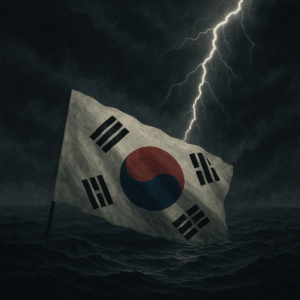Introduction
South Korea is facing one of its most dangerous economic moments in recent years. With fresh U.S. tariffs hitting key exports and internal political instability shaking confidence, experts are warning of a major economic storm that could impact not just Korea—but the global market.

What Happened
In April 2025, the U.S. government announced sweeping tariffs on South Korean imports, including a 25% duty on cars and electronics. These are sectors where Korean companies like Hyundai, Samsung, and LG dominate, making the impact especially harsh.
To make matters worse, a 46% tariff was imposed on imports from Vietnam—where many Korean companies have relocated production to cut costs. Now, even goods made in Vietnam by Korean firms are facing steep penalties when entering the U.S. market. This double hit has thrown the country’s export strategy into chaos.
Meanwhile, South Korea’s political landscape is equally unstable. The sudden impeachment and reinstatement of the acting president within a few months has caused confusion both domestically and internationally. Investors are pulling back, and government policy has become reactive rather than proactive.
Why It Matters
South Korea’s economy is heavily reliant on exports, particularly to the U.S. Any disruption to that flow has immediate consequences on jobs, corporate profits, and economic growth. And when internal political drama gets added to the mix, it creates an environment of uncertainty that can scare off foreign investors and slow down policy response.
Global institutions have already revised South Korea’s growth forecast downward, reflecting the seriousness of the current crisis. If left unaddressed, this could spiral into a longer-term slowdown that affects everything from wages to innovation.
My Take
This is more than just a rough patch—it’s a critical warning sign. For years, Korea’s economic success has leaned too heavily on global exports and predictable political order. Now that both are under threat, the country needs to pivot.
This might be the moment to invest more in domestic demand, diversify trade partners, and focus on long-term resilience rather than short-term wins. I also believe political stability isn’t a luxury anymore—it’s an economic necessity.
Conclusion
South Korea stands at a crucial crossroads. With the U.S. tightening its trade grip and domestic politics in disarray, the road ahead won’t be easy. But how the country responds in the coming months could define its economic future for years to come. What’s clear is that business as usual is no longer an option.